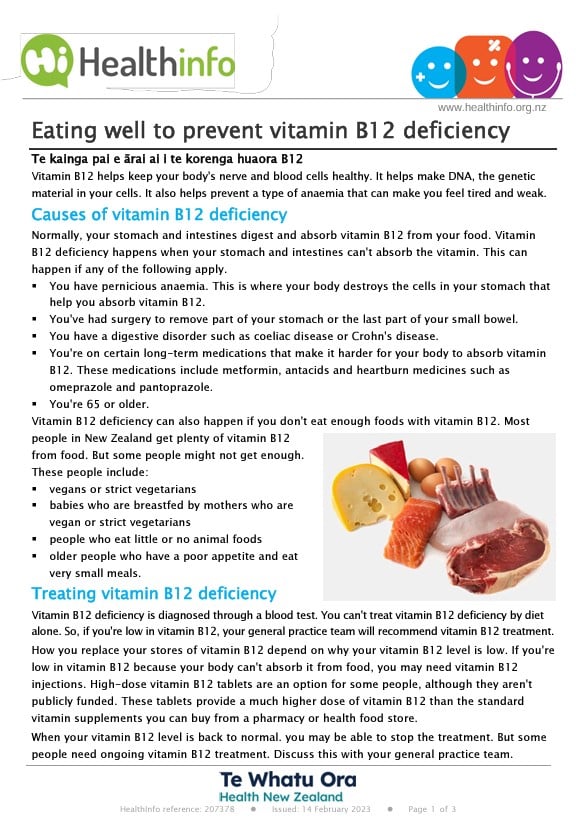If you're a frequent visitor to Healthify, why not share our site with a friend? Don't forget you can also browse Healthify without using your phone data.
Pernicious anaemia
Say 'per-nish-us'.
Key points about pernicious anaemia
- Pernicious anaemia occurs when your body doesn’t have enough vitamin B12 to make red blood cells.
- Pernicious anaemia is caused by an autoimmune condition and it's one of the causes of vitamin B12 deficiency.
- Other causes of low B12 levels include digestive difficulties and not getting enough vitamin B12 in your diet.
- Pernicious means harmful, and untreated pernicious anaemia can cause harm to many systems in your body.
- Treatment with vitamin B12 injections is key to preventing serious health issues.

Vitamin B12 is essential for your body to create new red blood cells, which carry oxygen around your body. It also has a role in helping your nerves and brain function. Most people absorb vitamin B12 from food such as eggs, diary and meat.
Pernicious anaemia is an autoimmune condition where your immune system attacks cells in your stomach that make a protein called intrinsic factor. Intrinsic factor is needed for your body to absorb vitamin B12 from the food you eat.
Without enough vitamin B12, you can feel tired, weak and lethargic. Over time, a lack of vitamin B12 can lead to serious health problems. Read more about vitamin B12.
If you have pernicious anaemia, your body can't make enough healthy red blood cells because it doesn't have enough vitamin B12 due to a lack of intrinsic factor. Without enough vitamin B12, your red blood cells don't divide normally and can’t carry out their job of moving oxygen around your body.
Other causes of low vitamin B12 include:
- digestive conditions, such as Crohn's disease and coeliac disease
- surgery to remove parts of your bowel
- some medicines that affect the absorption of vitamin B12, such as proton pump inhibitors, certain ant-seizure medications and diabetes medicines
- not getting enough B12 from your food, eg, from having a strict vegan diet.
Early on there may be no symptoms from pernicious anaemia but eventually, without enough red blood cells to carry oxygen to your body, you may feel tired and weak.
Other symptoms of low vitamin B12 include:
- a sore, swollen tongue or mouth ulcers
- pins and needles or numbness
- vision problems
- unsteadiness
- depression
- confusion
- memory problems.
Severe or long-lasting pernicious anaemia can damage your heart, brain and other organs. It can cause problems such as nerve damage, memory loss and gut problems. You may also may be at higher risk for weakened bone strength and stomach cancer.
Pernicious anaemia usually develops over the age of 50. Women are more often affected than men and it tends to run in families. It occurs more often in people who have other autoimmune diseases and in people of northern European descent.
Other than people born with a lack of intrinsic factor, people most at risk of vitamin B12 deficiency include:
- People who eat a vegan diet and don't take a vitamin B12 supplement.
- Breastfed infants of vegan mothers – these infants can develop anaemia within months of being born because they haven't had enough time to store vitamin B12 in their bodies.
- People who drink excess alcohol.
- Older adults or others who may not get enough nutrients from their diet.
- People with undiagnosed gastrointestinal disorders, such as Crohn’s disease or coeliac disease.
See your healthcare provider if you have the symptoms listed above. A blood test can be done to measure your vitamin B12 levels. If they're low, further blood tests can check for the antibodies found in pernicious anaemia.
Treatment for pernicious anaemia is essential to avoid long-term damage to your organs. You will need vitamin B12 injections to replace then keep up your body stores of vitamin B12. Vitamin B12 injection is also called hydroxocobalamin. At the start of treatment, the injections are usually given frequently over 2 to 3 weeks. This quickly builds up your body's store of vitamin B12. After that, you'll need vitamin B12 injections less often (every 2 to 3 months).
Vitamin B12 tablets are not usually recommended to treat pernicious anaemia because very little vitamin B12 is absorbed from the gut. Also, vitamin B12 tablets that have high-enough doses of vitamin B12 needed to treat pernicious anaemia are not easily available. Some pharmacies may have to order it in specifically for you.
Note that vitamin B complex tablets do not contain any vitamin B12.
Good food sources of vitamin B12 include:
- meats such as beef, liver, poultry and fish
- eggs and dairy products, such as milk, yoghurt and cheese
- foods fortified with vitamin B12, such as soy-based drinks and breakfast cereals.
Read more about vitamin B12 and how to eat well to prevent vitamin B12 deficiency(external link).
Vitamin B12 deficiency(external link) NHS, UK
Brochures
Eating well to prevent vitamin B12 deficiency(external link) Health New Zealand | Te Whatu Ora, NZ
Vitamin B12 fact sheet for consumers(external link) National Institute of Health, US
References
- Vitamin B12 deficiency and pernicious anaemia(external link) Health New Zealand | Te Whatu Ora, NZ
- Pernicious anaemia(external link) National Heart, Lung & Blood Institute, US, 2022
- Pernicious anaemia and vitamin B12 deficiency(external link) Patient Info, UK, 2024
Investigating the gut – pernicious anaemia(external link) BPAC, NZ, 2010
Vitamin B12 and pernicious anaemia(external link) Health New Zealand | Te Whato Ora, NZ
Esposito G, Dottori L, Pivetta G, et al. Pernicious anemia – the hematological presentation of a multifaceted disorder caused by cobalamin deficiency(external link) Nutrients 2022 Apr 17;14(8):1672
Brochures

HealthInfo, NZ, 2023

National Institute of Health, US, 2021
Credits: Healthify editorial team. Healthify is brought to you by Health Navigator Charitable Trust.
Reviewed by: Dr Art Nahill, Consultant General Physician and Clinical Educator
Last reviewed:





